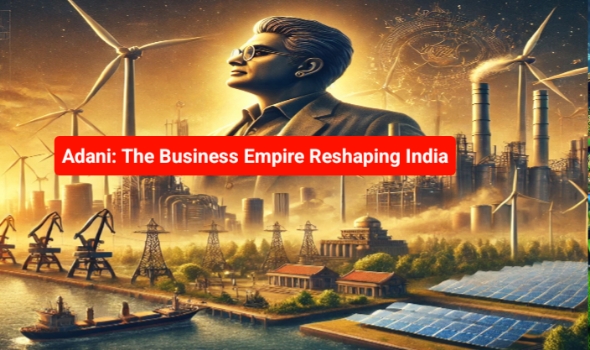Adani: The Business Empire Reshaping India’s Economic Landscape, Gautam Adani, a first-generation entrepreneur from Gujarat, established the Adani Group with a focus on trading operations.
Adani
Adani Group, one of India’s largest and most influential conglomerates, has been at the forefront of the country’s economic transformation. Founded by Gautam Adani in 1988, the group’s exponential growth has spanned multiple sectors, including infrastructure, energy, logistics, and agriculture. With a global footprint and an ambitious vision, Adani Group has emerged as a major player in shaping not only India’s economy but also its global economic engagements.
This article delves into the rise of the Adani Group, its core businesses, controversies, and its pivotal role in India’s economic future.
The Origins of Adani Group
Gautam Adani, a first-generation entrepreneur from Gujarat, established the Adani Group with a focus on trading operations. Initially trading in agricultural and power commodities, the company quickly expanded into infrastructure development. The group’s first major breakthrough came with the development of the Mundra Port in Gujarat, which would go on to become India’s largest commercial port.
By the 2000s, Adani Group had diversified into power generation, coal mining, and logistics, laying the groundwork for its position as a leader in these industries.
Core Business Verticals
Adani Group operates across several critical sectors of the Indian economy:
1. Ports and Logistics
The group’s flagship company, Adani Ports and Special Economic Zone Limited (APSEZ), operates 13 ports across India, including Mundra, Krishnapatnam, and Dhamra. These ports handle a significant portion of India’s cargo, making Adani the largest port operator in the country.
2. Energy and Power
- Renewable Energy: Adani Green Energy Limited (AGEL) is a leader in renewable energy, with one of the world’s largest solar energy portfolios.
- Thermal Power: Adani Power is a key player in thermal power generation, supplying electricity to multiple states in India.
3. Mining and Resources
Adani Group has substantial interests in coal mining, both domestically and internationally. The Carmichael coal mine in Australia has been one of its most high-profile projects, albeit surrounded by environmental controversies.
4. Agribusiness
Adani Wilmar, a joint venture with Wilmar International, is a major player in the edible oils market under the “Fortune” brand.
5. Data Centers and Digital Infrastructure
Recently, Adani Group has forayed into data centers and digital connectivity, aligning with India’s vision for a digital economy.
6. Aerospace and Defense
In collaboration with global companies, the Adani Group is venturing into defense manufacturing, a key focus area for India’s self-reliance initiative.
Global Expansion
Adani’s vision extends far beyond India’s borders. The acquisition of strategic assets in Australia, Sri Lanka, and Israel underscores its global ambitions. For example:
- The Carmichael coal mine in Australia marks Adani’s significant footprint in international mining.
- Adani Ports acquired Haifa Port in Israel, strengthening India’s trade relations in the Mediterranean region.
Adani’s Role in India’s Growth
The Adani Group’s contributions align closely with India’s economic priorities:
- Infrastructure Development: Adani’s investments in ports, airports, and highways have significantly boosted India’s infrastructure rankings globally.
- Renewable Energy Leadership: The group’s commitment to green energy aligns with India’s target of achieving net-zero emissions by 2070.
- Job Creation: With thousands of employees across its ventures, Adani Group is a major contributor to employment.
Controversies and Challenges
Despite its success, the Adani Group has faced numerous controversies and criticisms.
1. Environmental Concerns
Projects like the Carmichael coal mine have attracted significant backlash from environmentalists and activists, who argue that the group’s activities contribute to climate change and ecological degradation.
2. Allegations of Monopoly
Critics argue that Adani Group’s dominance in multiple sectors raises concerns about monopolistic practices, potentially stifling competition.
3. Political Allegations
The group’s proximity to the government has led to accusations of favoritism. Gautam Adani’s relationship with Prime Minister Narendra Modi has often been a topic of political debate.
4. Financial Transparency
Adani Group’s rapid expansion has raised questions about its debt levels. Critics have expressed concerns about the group’s financial sustainability and the risks posed to lenders.
Resilience Amidst Challenges
Despite these challenges, the Adani Group has demonstrated resilience. Strategic partnerships, robust growth in renewable energy, and its alignment with India’s economic priorities have helped it maintain investor confidence.
Looking Ahead: The Future of Adani Group
The Adani Group’s future strategies focus on sustainability, innovation, and global expansion.
1. Renewable Energy
Adani Green Energy aims to achieve 45 GW of renewable energy capacity by 2030, contributing significantly to India’s clean energy goals.
2. Digital Transformation
With its entry into data centers and digital connectivity, the group aims to support India’s digital economy ambitions.
3. Infrastructure Projects
Adani is investing in airport operations, aiming to manage more than 10 airports across India by 2030.
4. Global Partnerships
Collaborations with international firms in sectors like aerospace, defense, and logistics are expected to boost its global footprint.
Conclusion
The Adani Group embodies the spirit of entrepreneurial ambition and innovation that has defined India’s economic transformation. While controversies and challenges remain part of its narrative, the group’s contributions to infrastructure, energy, and economic growth are undeniable.
As the Adani Group continues to evolve, its ability to balance growth with sustainability and address criticisms will determine its legacy as a transformative force in India and beyond.
How did you like the information given in our article today, please tell us in the comment section and for more such posts, follow our page the News House, thank you


